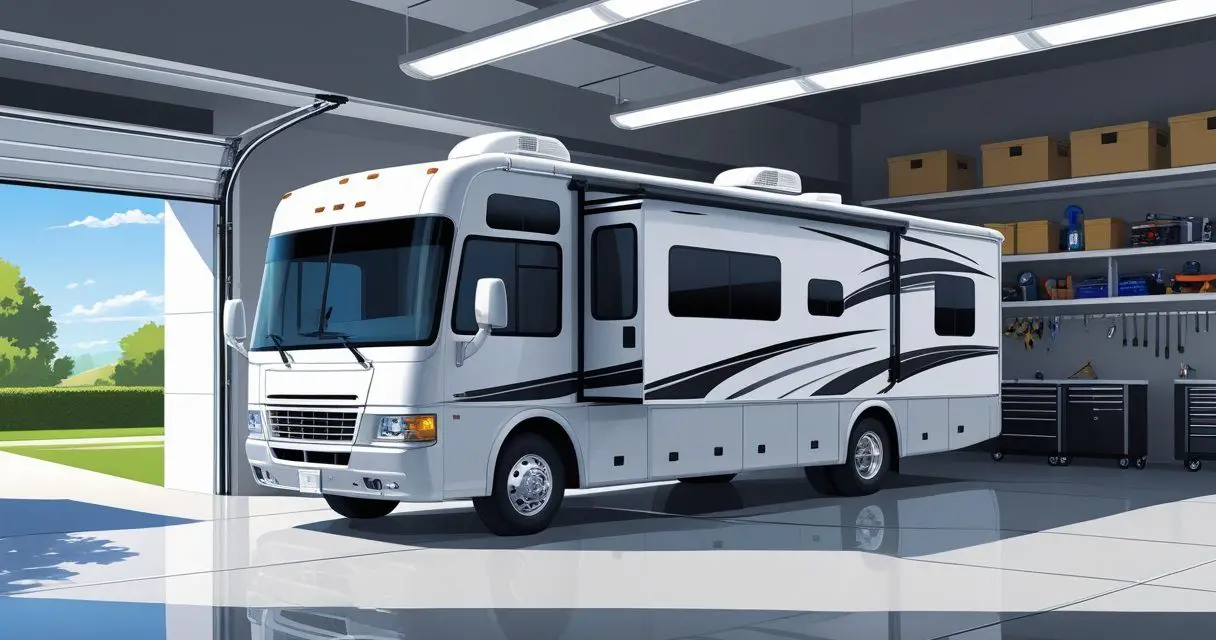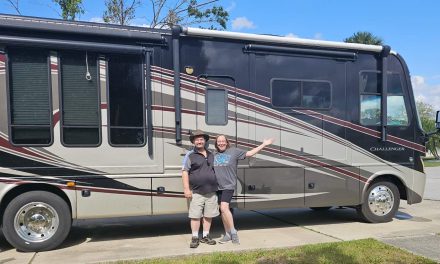Owning an RV is all about freedom, adventure, and the thrill of the open road. But when the journey ends, the real challenge begins: finding a safe and secure place to store your home-on-wheels. One of the most overlooked (and expensive) details is the height of your garage door. This seemingly small measurement can make the difference between hassle-free storage and a costly disaster. In fact, garage door height is one of the top reasons RV owners end up with unexpected repair bills or storage costs. Let’s dig into the secrets, facts, and truths about why your garage door height could cost you thousands—and how to avoid those headaches.
1. The Standard Garage Door Trap
Most residential garage doors are only 7 to 8 feet high, while many RVs—especially Class A and fifth wheels—can easily reach 10 to 13 feet in height. According to the RV Industry Association, the average Class A motorhome stands at about 12 feet, which instantly disqualifies most home garages. Trying to squeeze your RV into a too-short garage can result in thousands of dollars in roof, AC unit, or satellite dish repairs. Even if you manage to fit, repeated close calls can cause long-term damage to your RV’s exterior. If you think “just one more inch” will make it, you’re playing a risky game that rarely ends well.
If you want to avoid costly mistakes, the recommended minimum garage door height for most RVs is at least 14 feet. This allows for safe clearance for even larger Class A motorhomes and fifth wheels, plus room for rooftop accessories.
2. Custom Garage Doors: An Expensive Solution
Custom garage doors designed for RVs typically range from 12 to 14 feet in height and can cost anywhere from $3,000 to $10,000 or more, depending on materials and installation. Add in structural modifications to your garage, and the price tag can easily double. According to HomeAdvisor, the national average cost to build an RV garage is around $40,000. While this is a hefty investment, it can protect your RV from weather damage, theft, and vandalism. Still, your wallet might need its own recovery trip after seeing the bill.
At these prices, your garage might end up being fancier than your RV—just don’t let your RV get garage envy!
3. The Hidden Costs of Outdoor Storage
If your garage door is too short, you might consider outdoor storage. While monthly fees range from $50 to $300, the real expense comes from exposure to the elements. Sun, rain, and snow can cause up to $2,000 in annual maintenance and depreciation, according to RV repair experts. Insurance premiums are also higher for RVs stored outdoors, and theft risk increases significantly. Suddenly, that “cheap” outdoor spot doesn’t look so affordable.
Your RV might get a better tan than you, but it’ll pay for it in wrinkles (and repair bills)!
4. HOA Rules and Neighborhood Nightmares
Many homeowners’ associations (HOAs) have strict rules against parking RVs in driveways or on the street. Violating these rules can result in fines ranging from $50 to $500 per incident, and some HOAs even threaten legal action. According to a Community Associations Institute survey, over 60% of HOAs restrict RV parking. If your garage door isn’t tall enough, you might find yourself on a first-name basis with the HOA president—and not in a good way. The only thing worse than an angry HOA is an angry spouse who just got the fine notice.
Would you like to save this article?
Breaking HOA rules is like sneaking snacks into a movie theater—thrilling until you get caught, and then it’s just expensive.
5. Resale Value: The Long-Term Impact
A home with an RV-friendly garage can command a premium in the real estate market. According to Zillow, homes with RV garages sell for up to 10% more in areas popular with RV owners. Conversely, a garage that’s too short can turn away potential buyers, especially those with big rigs. Think of your garage as an investment in both your property and your RV’s longevity. Skimping on garage height could cost you thousands when it’s time to sell.
If your garage can’t fit an RV, it’s basically just a really expensive storage unit for your lawn mower!
6. Insurance Surprises
Insurance companies often ask where and how your RV is stored. Secure, indoor storage can lower your premiums by up to 20%, while outdoor or street parking can increase your rates—or even limit your coverage. According to Progressive, RV owners who store their vehicles in a garage pay significantly less over time. Failing to provide proper storage can also lead to denied claims if damage occurs. That low garage door could be costing you extra every single year.
If your insurance agent starts sending you holiday cards, it might be time to rethink your storage strategy!
7. Safety and Security Risks
RVs are tempting targets for thieves and vandals, especially when parked outside or in visible locations. The National Insurance Crime Bureau reports that RV thefts and break-ins spike during off-season months when vehicles are left unattended. A tall, secure garage door not only protects your RV from the elements but also from unwanted attention. Investing in a proper garage could save you thousands in stolen property and repairs. Plus, you’ll sleep better knowing your home-on-wheels is safe and sound.
If your RV spends more time on “America’s Most Wanted” than you do, it’s time to upgrade your garage!
Advice on Minimum Height:
For most RVs, especially if you want to future-proof your storage, a minimum garage door height of 14 feet is recommended. This will accommodate almost all Class A, Class C, and fifth wheel RVs, including rooftop accessories like air conditioners and satellite dishes. Always measure your RV at its tallest point and add at least 6 inches of clearance for safety.







